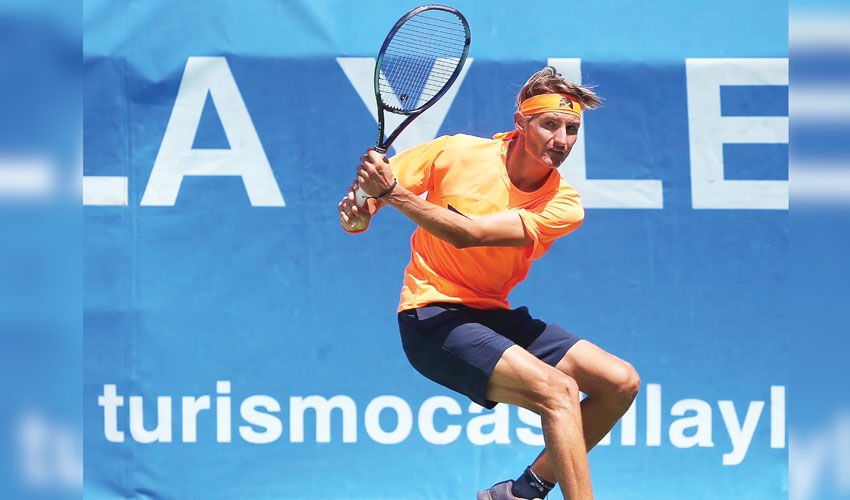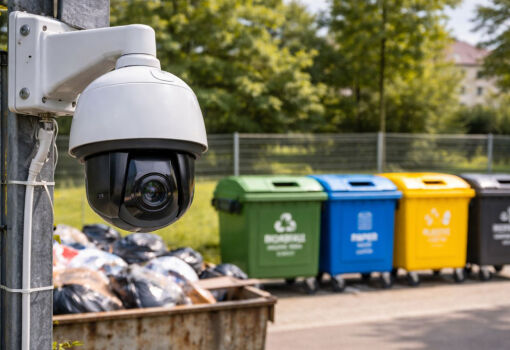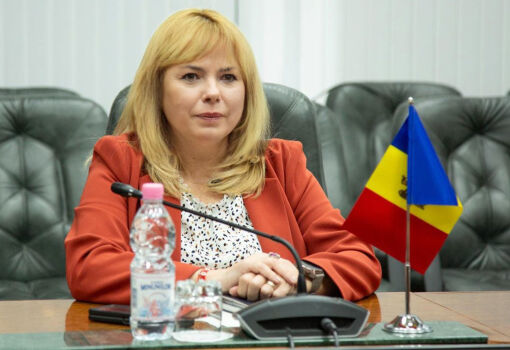
LP: – You won three ITF tournaments this season: singles in Slobozia and doubles in Bacau and Pitesti. You won as many trophies in one month as you did in the three previous years. Was it a successful season?
– Three trophies in three tournaments in a row is a very good result for me. I’m focusing on singles tournaments. I am very happy that one of the victories was in this category. Unfortunately, I didn’t achieve such success in Bacau and Pitesti, but I did very well in doubles, which is also important for my sports career. At least I fulfilled my plans for the summer!
LP: – You are ranked 733rd in the ATP doubles rankings and 487th in singles. Your career best was more than two years ago at 332nd in singles. Are you planning to improve your career record? What are you doing for that?
– Taking into account that I haven’t played enough tournaments this year, I think this figure is quite good. In the future I plan to improve my position in the ATP rankings. But at the moment it doesn’t bother me much. I am now studying at the University of Nevada (USA) and represent it at tournaments. I don’t have the opportunity to play in ITF and ATP Challenger tournaments all year round – only in the summer so far. I am concentrating on the training process, raising my professional level. In any case, I notice progress in my game.
LP: – At the tournaments in Bacau and Pitesti you played in doubles with Uruguayan Franco Roncadelli, but in singles you lost to him twice. Were you not offended?
– Franco Roncadelli and I have known each other for quite a long time, I played against him several times before in singles. In Bacau I didn’t feel well, I had stomach problems. Physically I couldn’t demonstrate the level of my game, so I lost. At the tournament in Piteşti I felt better, I was leading 3:1 in the third set, but I lost…. Franco then reached the final. Of course, it was a shame to lose to him. I will work on myself in order to “close” such matches in the future.
LP: – It is difficult to have a constant partner at tennis tournaments. Not everyone has brothers like Bob and Mike Bryan with whom you can have a successful doubles career. How is the decision made on who to play doubles with? What is important to you in a partner?
– I always try to play doubles with people I know. Mutual understanding is very important in doubles. If I don’t like a tennis player as a person, I’m unlikely to play with him in tandem. I take the choice of a partner very seriously, especially in this component – establishing personal contact with him and building rapport.
LP: – How many points do you lack to play in ATP tournaments? Or are you satisfied with the ITF level?
– My first priority is to start playing ATP Challenger tournaments continuously, after which I can qualify for ATP tournaments. By playing ITF tournaments you can earn points at the ATP Challenger. I don’t need that many points, about a hundred, but again – due to my studies in the USA, I can’t participate in tournaments all the time.
LP: – You played at the first ever tennis tournament “Moldova Open” in your native Chisinau – ATP Challenger 50. Did you like the level of organization of the tournament? Do you think that our country is ready for a more status tournament, for example, ATP Challenger 100?
– The first, we can say, home tournament in Chisinau was very well organized. I talked to many guys from the tour – all of them were very satisfied. In my opinion, the Tennis Federation and all the organizers did a very good job. I hope that in the future more high-profile tennis tournaments will be organized in Moldova. We are fully ready to organize such sports events!
LP: – Tell us about your preparation. Who trains and advises you? Where do you like to train most of all?
– I train most of the time in Las Vegas, at the University of Nevada. I am coached by the former Moldovan tennis player and former Davis Cup participant Alexandru Cozbinov (he joined the coaching staff of the university in spring 2024 under the leadership of head coach Andy Jackson – editor’s note). I am absolutely satisfied with everything. I can confidently say that my favorite place to train is in Nevada.
LP: – Do you feel the support of the Moldavian Tennis Federation? If yes, how tangible is it?
– Yes, the Tennis Federation supports me. This year thanks to its support I received a Wild Card (a special invitation of a tennis player to the competition bypassing the standard requirements – author’s note) to participate in tournaments in Tbilisi and Chisinau. I felt her support even during my participation in the junior tour, she paid for my trips and trainings.
LP: – Why did you choose tennis over other sports? Did you see yourself only as a tennis player?
– My father wanted to take me and my brother to soccer, but my godfather was a relative who was a tennis coach. He coached me for the first 10 years of my career, thanks to which I started to play professional tennis.
LP: – How did your sports career start? Where did you train and gain experience?
– I started practicing tennis at the age of five. I trained in Chisinau, in the complex “Labor Reserves” (now called “Olimpia” – author’s note), as part of a group coached by my godfather.
LP: – Is there any coach in your career, whose merits you would like to emphasize? Maybe there are several?
– I would like to especially mention my first children’s coach Denis Matvievich, who made a great contribution to my career. I would also single out Ilya Babinchuk. He still coaches me when we cross paths at tournaments in Europe. My junior path was with Andrei Gorban, who is still playing for Moldova in the Davis Cup. I also trained in Romania under the guidance of the former world 110th racket player Ionut Moldovan. I can’t help but mention Alexandr Kozbinov, with whom we train in Las Vegas.
LP: – Can you name the main problems that beginners face in Moldova?
– The main problem is the lack of qualified coaches who could give tennis players the base necessary to advance in their careers. Compared to other countries, there is a lack of competition and tournaments. There are no full-fledged tennis complexes in Moldova, where there would be both fitness and tennis coaches, and the athletes would be provided with all the necessary conditions.
LP: – In your opinion, can tennis become a mass sport in Moldova, given its high cost and inaccessibility for many families that do not have the necessary finances?
– Tennis in Moldova has all chances to become a very popular sport. Everything is going towards it: new tennis complexes and courts are being built, more players are coming. Despite the fact that tennis is a very expensive sport, parents and their children show great interest in it.
LP: – Winning three tournaments in Romania allowed you to earn more than $6 thousand – according to the data provided by the organizers of the tournaments. Is prize money an important factor in your game? Does money motivate you to achieve better results?
– Actually I didn’t earn $6k, but about $4k. Money is a motivating factor for me to win, but definitely not the main priority.
LP: – You are a student at UNLV. What are your impressions of the conditions provided by the university?
– I flew to Las Vegas earlier this year. What made a very good impression on me was that immediately upon arrival my training process was set up. I had a lot of people on my team who wanted to help me. I didn’t expect that the university could provide such a great opportunity. I plan to train and study here for several years.
LP: – You became the second tennis player in UNLV history to be recognized as the top player and top freshman in the same season. You also became the first athlete in more than a decade with a preseason ITA Collegiate Tennis Rankings national ranking. You start your sophomore season ranked 83rd, well above Ace Mathias, who was ranked 123rd in the preseason rankings in 2014. What helped you achieve such high results?
– I was able to achieve such results thanks to discipline, efficiency and belief in myself. The experience I gained in the previous five years of playing in UTR, ITF, ATP Challenger tournaments also played a big role. When I came to Nevada, I made sure that I was “a head above” all my conference rivals. Undoubtedly, this influenced the result.
LP: – What differences in the training of athletes in Moldova and the USA would you note first of all?
– It is difficult to compare. The opportunities offered to tennis players here are huge. The sports infrastructure in American universities is of a cosmic level!
LP: – What is the approximate annual cost of education at UNLV in the specialization “Tennis”? How much should applicants start from?
– Tuition at the university ranges from $40 thousand to $50 thousand per year. But for me the tuition is free, as I play for the tennis team.
LP: – Do you follow the ATP World Tour? Which of the world tennis stars can you call your idol?
– Yes, of course, I follow the world tour. I can’t name any idol, but I like the game of Carlos Alcaraz and Lorenzo Musetti. Guys my age. I remember playing with them at youth tournaments. I am very happy that they have reached such heights!
LP: How do you see your future in tennis? What are your dreams?
– My dream is to be among the top 100 tennis players in the world, but I realize that many factors have to coincide for it to be realized. The main one is the financial component. Traveling to tournaments is an expensive endeavor, and it requires a whole team. Mostly I travel alone, and in these conditions it is very difficult to achieve outstanding results at major tournaments.
PHOTO: Ilya Snitsar

